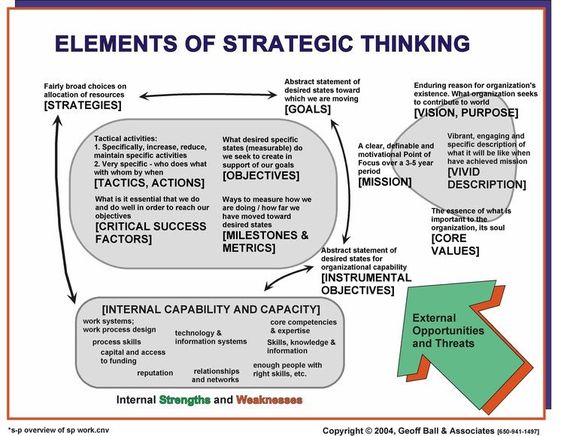In today’s fast-paced and complex business environment, it’s crucial to know the difference between strategic and tactical thinking. Although these terms are often used interchangeably, they refer to different approaches, skills, and levels of decision-making. Let’s dive into the details.
What is Strategic Thinking?
Strategic thinking is a long-term, big-picture approach to decision-making. It involves analyzing the current situation, identifying trends and patterns, evaluating risks and opportunities, setting goals and objectives, and developing a plan to achieve them. Strategic thinkers focus on the future and how to position their organization for success over time. They consider multiple factors, such as market trends, competition, customer needs, technology, and resources, to create a comprehensive strategy that aligns with their vision and mission.
What is Tactical Thinking?
Tactical thinking, on the other hand, is a short-term, detail-oriented approach to decision-making. It involves executing the plan that has been developed through strategic thinking. Tactical thinkers focus on the immediate tasks and actions required to implement the strategy correctly. They take care of the day-to-day operations, such as managing projects, allocating resources, solving problems, and communicating with team members. Tactical thinking is critical to achieving strategic objectives since it ensures that the plan is carried out effectively and efficiently.
Key Differences between Strategic and Tactical Thinking
While strategic and tactical thinking complement each other, there are unique differences between them. These include:
1. Time Horizon: Strategic thinking is long-term, while tactical thinking is short-term. Strategic thinkers look ahead several years or more, while tactical thinkers focus on the present and near future.
2. Scope: Strategic thinking is broad and global, while tactical thinking is specific and local. Strategic thinkers consider the overall market, industry, and organization, while tactical thinkers deal with the details of the task at hand.
3. Creativity: Strategic thinking requires creativity and innovation, while tactical thinking relies on operational excellence and best practices. Strategic thinkers explore new ideas, solutions, and business models, while tactical thinkers optimize existing processes and methods.
4. Risks: Strategic thinking involves managing risks and uncertainty, while tactical thinking prioritizes risk mitigation and problem-solving. Strategic thinkers weigh the potential rewards and risks of their decisions, while tactical thinkers respond to immediate challenges and opportunities.
5. Leadership: Strategic thinking requires strategic leadership, while tactical thinking requires operational leadership. Strategic leaders inspire and motivate their teams to achieve long-term goals, while tactical leaders direct and supervise their teams to accomplish short-term objectives.
6. Evaluation: Strategic thinking focuses on performance measurement and evaluation, while tactical thinking ensures compliance and quality control. Strategic thinkers assess whether their strategy is working and make adjustments accordingly, while tactical thinkers ensure that the plan is followed and executed effectively.
7. Communication: Strategic thinking involves communicating vision and strategic direction, while tactical thinking involves communicating tasks and responsibilities. Strategic thinkers inspire, influence, and persuade stakeholders towards a common goal, while tactical thinkers provide clarity and guidance to their team.
8. Agility: Strategic thinking requires strategic agility, while tactical thinking requires operational agility. Strategic agile organizations can adapt to changes in the market, environment, and technology, while operational agile organizations can respond to changes in customer demand, supply chain, and workforce.
You might find these FREE courses useful
- Strategic Management – Capstone Project
- Strategic Management Certificate | IIM Kozhikode | Coursera
- Entrepreneurial Strategic Management
- Strategic Leadership and Management Capstone
How to Develop Strategic and Tactical Thinking Skills?
Both strategic and tactical thinking skills are essential for leaders and managers at all levels of the organization. Here are some ways to develop these skills:
1. Read books, articles, and blogs on strategy and tactics to gain insights and knowledge.
2. Attend training and development programs on strategic and tactical thinking to learn from experts and peers.
3. Practice critical thinking, problem-solving, and decision-making skills to enhance your analytical abilities.
4. Develop communication and leadership skills to inspire and guide your team.
5. Regularly evaluate and reflect on your performance and adjust your approach based on feedback and results.
In conclusion, strategic and tactical thinking are two sides of the same coin. They require different approaches, skills, and mindsets, but they are both necessary for achieving long-term success. By understanding the key differences between them and developing your strategic and tactical thinking skills, you can become a more effective and impactful leader in today’s dynamic business world.
